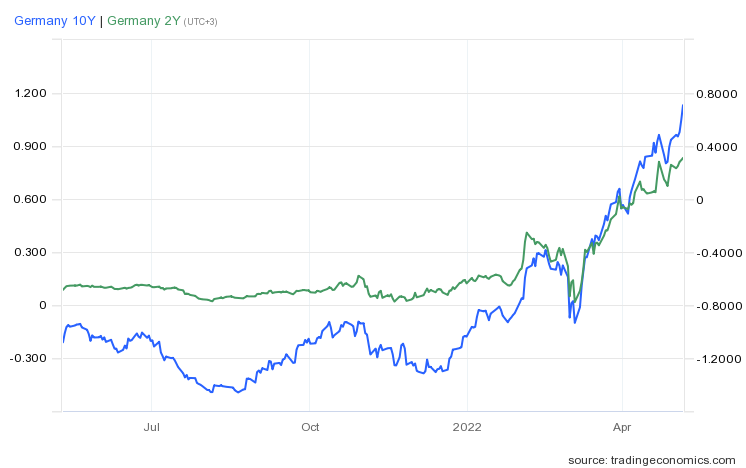
Lately, more and more publications have been warning about the looming recession hanging over the European economy. According to the reports, there is much to be alarmed about on economic growth in the region.
To begin with, Inflation in the eurozone hit a record high of 7.5% in March. So far, the European Central Bank has remained more dovish than its peers, such as the Bank of England and the U.S. Federal Reserve, both of which have begun hiking interest rates in a bid to rein in inflation. While the European Central Bank predicts a slowdown in the second half, the rate probably won’t fall below 4% this year.
Moreover, a disappointing first-quarter gross domestic product data doesn’t allow for positive forecasts. The euro area grew only 0.2%, less than economists anticipated, affected by a contraction in Italy, stagnation in France, and weaker-than-expected growth in Spain.
Another negative factor is that the eurozone, already reeling from the pandemic, faces another danger of recession, this time caused by the disagreement on supply of natural gas deliveries from Russia. Russia accounted for 55% of Germany’s gas imports in 2021 and 40% in the first quarter of 2022. If Germany does not secure enough gas, industry, which accounts for a quarter of German gas demand, will be hit first. There are many options on the table, like imports from other countries, renewable energy, and liquefied natural gas (LNG) from the United States. But all these backup plans can barely cover the shortage that will be caused by banning Russian gas.
Still, some analysts see a silver lining behind these clouds. They point to data from German sovereign debt markets, where bond yield curves, which are closely watched as financial market indicators, grow steadily. It is seen as a good indicator of growth and inflation trends. The two-year/10-year German curve segment has steepened this year — meaning 10-year yields have risen faster than short-dated ones.
Critics note, however, that the German curve hasn’t proven itself as a reliable predictor of recession, in contrast to the U.S. one, which doesn’t demonstrate such an encouraging trend today.
All in all, the further destiny of the eurozone is now highly dependent on the global world changes and the solutions made by policymakers. The looming recession, if it comes, will be caused by a political crisis, not an economical meltdown.
Links:
